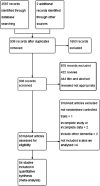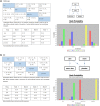Memantine, Donepezil, or Combination Therapy-What is the best therapy for Alzheimer's Disease? A Network Meta-Analysis
- PMID: 32914577
- PMCID: PMC7667299
- DOI: 10.1002/brb3.1831
Memantine, Donepezil, or Combination Therapy-What is the best therapy for Alzheimer's Disease? A Network Meta-Analysis
Abstract
Introduction: Alzheimer's disease (AD) is a degenerative brain disease that progresses over time, heavily burdening patients, families, and aging societies worldwide. Memantine and donepezil are frequently used in its treatment, both as monotherapy and in combination. This multiple treatment comparison meta-analysis assessed the efficacy of these regimens and placebo in the management of AD.
Methods: We searched PubMed, Embase, the Cochrane Library, and Wanfang Med Online and China National Knowledge Infrastructure for English and Chinese publications from the first records to 17 April 2020. Two investigators scanned articles for placebo-controlled trials of memantine and donepezil alone and in combination. We extracted data on the following outcomes: cognition, global assessment, daily activities, neuropsychiatric symptoms, adverse events, and the acceptability and cost of these treatment regimens.
Results: Of 936 records screened, we included 54 trials in this analysis. The combination therapy was more effective in improving cognition (mean difference (MD)-5.01, 95% credible interval (95% Crl) -10.73 to 0.86 in the Alzheimer's Disease Assessment Scale-Cognitive Subscale; MD 9.61, 95% Crl 2.29 to 16.97 in the Severe Impairment Battery), global assessment (MD -2.88, 95% Crl -6.04 to 0.40), daily activities (MD 13.06, 95% Crl -34.04 to 58.92), and neuropsychiatric symptoms (MD -6.84, 95% Crl -10.62 to -2.82) compared with placebo. Memantine was more acceptable than placebo (MD 0.93, 95% Crl 0.69 to 1.22).
Conclusions: Memantine plus donepezil showed superior outcomes for cognition, global assessment, daily activities, and neuropsychiatric symptoms, but lower acceptability than monotherapy and placebo. Combination therapy may be more cost-effective, because memantine slows the progression of AD.
Keywords: Acceptability of healthcare; Activities of daily living; Alzheimer disease; Cognitive function; Cost effectiveness; Disease progress.
© 2020 The Authors. Brain and Behavior published by Wiley Periodicals LLC.
Conflict of interest statement
The authors declare that there have no conflicts of interest.
Figures







Similar articles
-
Comparative efficacy and safety of cognitive enhancers for treating vascular cognitive impairment: systematic review and Bayesian network meta-analysis.Neural Regen Res. 2019 May;14(5):805-816. doi: 10.4103/1673-5374.249228. Neural Regen Res. 2019. PMID: 30688266 Free PMC article.
-
Comparative safety and effectiveness of cholinesterase inhibitors and memantine for Alzheimer's disease: a network meta-analysis of 41 randomized controlled trials.Alzheimers Res Ther. 2018 Dec 27;10(1):126. doi: 10.1186/s13195-018-0457-9. Alzheimers Res Ther. 2018. PMID: 30591071 Free PMC article.
-
Memantine treatment in patients with moderate to severe Alzheimer disease already receiving donepezil: a randomized controlled trial.JAMA. 2004 Jan 21;291(3):317-24. doi: 10.1001/jama.291.3.317. JAMA. 2004. PMID: 14734594 Clinical Trial.
-
Alzheimer's Disease: Efficacy of Mono- and Combination Therapy. A Systematic Review.J Geriatr Psychiatry Neurol. 2022 Jul;35(4):475-486. doi: 10.1177/08919887211044746. Epub 2021 Sep 3. J Geriatr Psychiatry Neurol. 2022. PMID: 34476990 Free PMC article.
-
Monotherapy Is Good Enough for Patients with Mild-to-Moderate Alzheimer's Disease: A Network Meta-analysis of 76 Randomized Controlled Trials.Clin Pharmacol Ther. 2019 Jan;105(1):121-130. doi: 10.1002/cpt.1104. Epub 2018 Jun 19. Clin Pharmacol Ther. 2019. PMID: 29717478
Cited by
-
N-methyl-D-aspartate receptor blockers attenuate bleomycin-induced pulmonary fibrosis by inhibiting endogenous mesenchymal stem cells senescence.Ann Transl Med. 2022 Jun;10(11):642. doi: 10.21037/atm-22-2507. Ann Transl Med. 2022. PMID: 35813315 Free PMC article.
-
Mapping new pharmacological interventions for cognitive function in Alzheimer's disease: a systematic review of randomized clinical trials.Front Pharmacol. 2023 Jun 1;14:1190604. doi: 10.3389/fphar.2023.1190604. eCollection 2023. Front Pharmacol. 2023. PMID: 37332343 Free PMC article.
-
Unveiling the multifaceted pathogenesis and therapeutic drugs of Alzheimer's disease: A comprehensive review.Heliyon. 2024 Oct 11;10(20):e39217. doi: 10.1016/j.heliyon.2024.e39217. eCollection 2024 Oct 30. Heliyon. 2024. PMID: 39629139 Free PMC article. Review.
-
NMDA Receptor Antagonists: Emerging Insights into Molecular Mechanisms and Clinical Applications in Neurological Disorders.Pharmaceuticals (Basel). 2024 May 15;17(5):639. doi: 10.3390/ph17050639. Pharmaceuticals (Basel). 2024. PMID: 38794209 Free PMC article. Review.
-
Effect of hormone replacement therapy on amyloid beta (Aβ) plaque density in the rhesus macaque amygdala.Front Aging Neurosci. 2024 Jan 11;15:1326747. doi: 10.3389/fnagi.2023.1326747. eCollection 2023. Front Aging Neurosci. 2024. PMID: 38274989 Free PMC article.
References
-
- Albert, M. S. , DeKosky, S. T. , Dickson, D. , Dubois, B. , Feldman, H. H. , Fox, N. C. , … Phelps, C. H. (2011). The diagnosis of mild cognitive impairment due to Alzheimer's disease: Recommendations from the National Institute on Aging‐Alzheimer's Association workgroups on diagnostic guidelines for Alzheimer's disease. Alzheimer's & Dementia: the Journal of the Alzheimer's Association, 7, 270–279. 10.1016/j.jalz.2011.03.008 - DOI - PMC - PubMed
-
- Alzheimer’s Association . (2019). Alzheimer's disease facts and figures. Alzheimer's & Dementia: The Journal of the Alzheimer's Association., 15(3), 321–387. - PubMed
Publication types
MeSH terms
Substances
Grants and funding
LinkOut - more resources
Full Text Sources
Other Literature Sources
Medical
Miscellaneous

